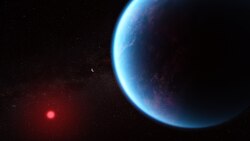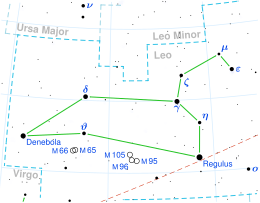கே2-18
Approximate two-dimensional location of the star (in red circle); Sigma Leonis is the nearest bright star, which is in a southerly direction, and the boundary of Virgo is similarly far. | |
| நோக்கல் தரவுகள் ஊழி J2000.0 Equinox J2000.0 | |
|---|---|
| பேரடை | Leo |
| வல எழுச்சிக் கோணம் | 11h 30m 14.51774s[1] |
| நடுவரை விலக்கம் | +07° 35′ 18.2553″[1] |
| தோற்ற ஒளிப் பொலிவு (V) | 13.50[2] |
| இயல்புகள் | |
| விண்மீன் வகை | M2.8[3] |
| வான்பொருளியக்க அளவியல் | |
| ஆரை வேகம் (Rv) | 0.02±0.52[1] கிமீ/செ |
| Proper motion (μ) | RA: −80.479 மிஆசெ/ஆண்டு Dec.: −133.007 மிஆசெ/ஆண்டு |
| இடமாறுதோற்றம் (π) | 26.2469 ± 0.0266[1] மிஆசெ |
| தூரம் | 124.3 ± 0.1 ஒஆ (38.10 ± 0.04 பார்செக்) |
| விவரங்கள் | |
| திணிவு | 0.495[4] M☉ |
| ஆரம் | 0.469[4] R☉ |
| ஒளிர்வு | 0.0234[5] L☉ |
| வெப்பநிலை | 3,503[4] கெ |
| தரவுதள உசாத்துணைகள் | |
| SIMBAD | data |
கே2-18 (K2-18) EPIC 201912552 என்றும் அழைக்கப்படுகிறது, இது ஒரு செங்குறுமீனாகும், இது புவியிலிருந்து 124 ஒளியாண்டுகள் (38 புடைநொடிகள்)[4] தொலைவில், சிம்ம (மடங்கல்) ஓரையில்அமைந்துள்ளது.
கோள் அமைப்பு
தொகுஇந்த விண்மீனில் கே2-18பி எனப்படும் ஒரு புறக்கோள் உள்ளது, இது கே2-18 கோளின் வாழக்கூடிய மண்டலத்திற்குள் அமைந்துள்ள ஒரு மீப்புவி ஆகும் . [6][7] நீரகம் நிறைந்த துணைநெப்டியூன் என்றாலும், [8] அதன் வளிமண்டலத்தில் நீர் கண்டுபிடிக்கப்பட்டாலும், வாழக்கூடிய மண்டலத்தில் இது முதல் புறக்கோள் ஆகும். இந்த விண்மீன் கே2-18சி என்ற இரண்டாவது கோளையும் கொண்டுள்ளது.[9] இது ஒரு சிறிய வளிமப் பெருங்கோளாகும்என கணினி ஓத ஒப்புருவாக்கம் வழி நிறுவப்பட்டுள்ளது. [10]
| துணை (விண்மீனில் இருந்து) |
திணிவு | அரைப்பேரச்சு (AU) |
சுற்றுக்காலம் (நாட்கள்) |
வட்டவிலகல் |
|---|---|---|---|---|
| c | 5.62±0.84 M⊕ | 0.0670 ± 0.0002 | 8.962±0.008 | <0.2 |
| b | 8.63±1.35 M⊕ | 0.1591±0.0004 | 32.94488±0.00281 | ? |
மேற்கோள்கள்
தொகு- ↑ 1.0 1.1 1.2 1.3 Vallenari, A. et al. (2023). "Gaia Data Release 3. Summary of the content and survey properties". Astronomy and Astrophysics 674: A1. doi:10.1051/0004-6361/202243940. Bibcode: 2023A&A...674A...1G. Gaia DR3 record for this source at VizieR.
- ↑ Zacharias, N.; Finch, C. T.; Girard, T. M.; Henden, A.; Jennifer Bartlett (astronomer); Monet, D. G.; Zacharias, M. I. (2012). "VizieR Online Data Catalog: UCAC4 Catalogue (Zacharias+, 2012)". VizieR On-line Data Catalog. Bibcode: 2012yCat.1322....0Z.
- ↑ Montet, Benjamin T. et al. (5 August 2015). "Stellar and Planetary Properties of K2 Campaign 1 Candidates and Validation of 17 Planets, Including a Planet Receiving Earth-like Insolation". The Astrophysical Journal 809 (1). doi:10.1088/0004-637X/809/1/25. Bibcode: 2015ApJ...809...25M.
- ↑ 4.0 4.1 4.2 4.3 Cloutier, Ryan et al. (7 January 2019). "Confirmation of the radial velocity super-Earth K2-18c with HARPS and CARMENES". Astronomy & Astrophysics 621. doi:10.1051/0004-6361/201833995. Bibcode: 2019A&A...621A..49C.
- ↑ Martinez, Arturo O. et al. (2017). "Stellar and Planetary Parameters for K2's Late-type Dwarf Systems from C1 to C5". The Astrophysical Journal 837 (1). doi:10.3847/1538-4357/aa56c7. Bibcode: 2017ApJ...837...72M.
- ↑ "HABITABLE EXOPLANETS CATALOG". UPR. 7 March 2016. பார்க்கப்பட்ட நாள் 12 September 2019.
- ↑ "EPIC 201912552 b reality check drewexmachina 11-22-2015". Drew ExMachina. 7 March 2016. பார்க்கப்பட்ட நாள் 12 September 2019.
- ↑ No, the Exoplanet K2-18b Is Not Habitable
- ↑ 9.0 9.1 Ferraz-Mello, S.; Gomes, G. O. (2020). "Tidal evolution of exoplanetary systems hosting potentially habitable exoplanets. The cases of LHS-1140 b-c and K2-18 b-c". Monthly Notices of the Royal Astronomical Society 494 (4): 5082–5090. doi:10.1093/mnras/staa1110. Bibcode: 2020MNRAS.494.5082G.
- ↑ "EPIC 201912552". Open Exoplanet Catalogue. 7 March 2016. பார்க்கப்பட்ட நாள் 12 September 2019.

